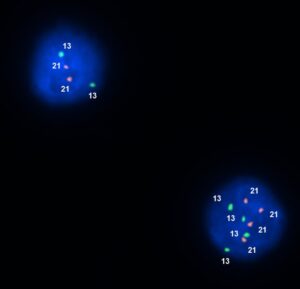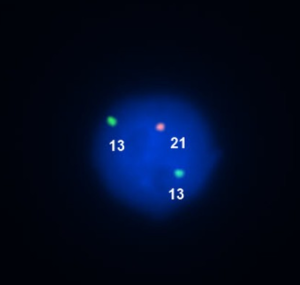Клініка репродуктивної медицини IVMED > Genetic testing of degraded embryos
Genetic testing of degraded embryos, FISH method for 5 chromosomes (13, 18, 21, X, Y) is a molecular cytogenetic study that allows to determine quantitative chromosomal abnormalities associated with the most common genetic disorders in the cells of an embryo that has stopped its development (degraded).
The FISH method is effective for detecting complex chromosomal aberrations and polyploidies, which is a characteristic feature of this type of preimplantation genetic testing. The FISH method is recommended for genetic diagnosis of embryos that have stopped in development. The information obtained will help to understand the potential cause of the developmental arrest and optimize further treatment with assisted reproductive technologies.
The test includes 5 chromosomes to study quantitative abnormalities (changes in number) on chromosomes 13, 18, 21, X and Y.
Detection during treatment with assisted reproductive technologies of embryos that have ceased to develop during the process of cultivation.
Why can embryos stop developing (degrade)?
Genetic testing of degraded embryos will help to find out whether the cause of embryo developmental arrest is the presence of chromosomal abnormalities in the cells under study.
The information obtained will become a reliable source for further diagnosis and the formation of an individual treatment plan by a reproductive specialist.
Genetic testing of degraded embryos, FISH method for 5 chromosomes is recommended for patients who need analysis of degraded embryos, namely the determination of quantitative chromosomal abnormalities (abnormalities). The 5 chromosome screening panel includes the study of aneuploidies on chromosomes 13, 18, 21, X and Y.
The method is effective for detecting complex chromosomal aberrations (chromosome structure disorders) and polyploidies (an increase in the number of all the chromosomes under study) of embryos that have stopped development.
For genetic testing of degraded embryos, the FISH method is used.
FISH (fluorescence in situ hybridization) is a molecular cytogenetic method that helps to detect specific DNA sequences in the nuclei of cells using special reagents (fluorescently labeled probes):
Normal (2 orange signals and 2 green signals) (image in the upper left corner)
Polyploidy (4 orange and 4 green signals) (image in the lower right corner)

Aneuploidy
Aneuploidy, one 21 chromosome is missing

Leave your contact information and our consultant will call you back and select the most convenient time, date, and doctor for a visit or online consultation.
Diagnostic tests, the choice of treatment, medications, programs - everything is adapted to your individual indicators and circumstances.
The clinic has been registered with the US Food and Drug Administration (FDA)
The clinic is certified according to the international quality management standard ISO 9001: 2015.
IVF-ID. Ukraine's first electronic system for protecting patient data and biological material.
By clicking, you accept the terms and conditions
“Consent to the collection and processing of personal data”